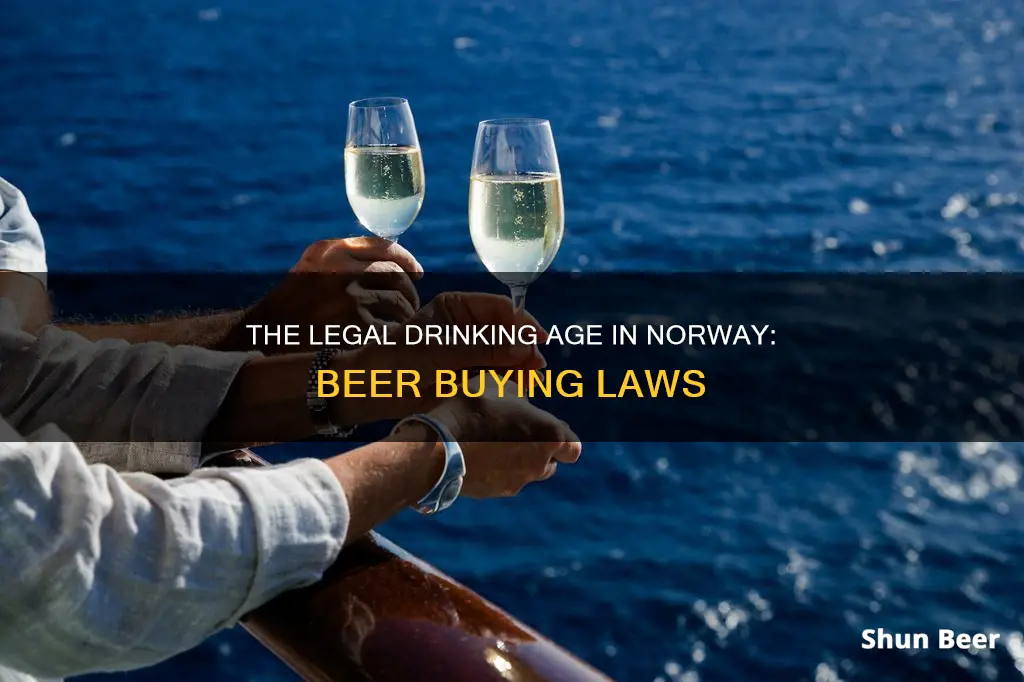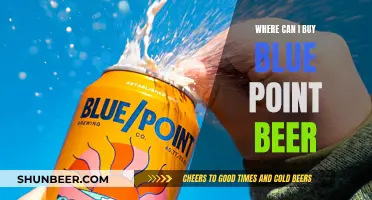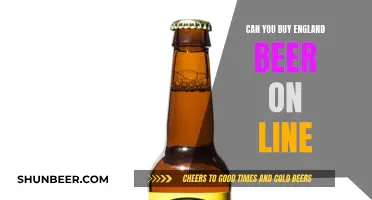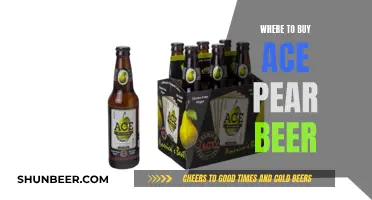
In Norway, the legal drinking age for buying beer and wine is 18 years, while the age for purchasing spirits is 20. This means that to buy beer in Norway, one must be at least 18 years old. Beer can be found in most supermarkets, but is only sold before 8 pm on weekdays and 6 pm on Saturdays. The sale of alcohol is subject to strict government regulations and high taxes, which aim to reduce alcohol-related health and social issues.
| Characteristics | Values |
|---|---|
| Legal drinking age for beer and wine | 18 years |
| Legal drinking age for spirits | 20 years |
| Where to buy beer and wine | Vinmonopolet (state-run alcohol stores), grocery stores |
| Where to buy spirits | Vinmonopolet |
| Beer availability in grocery stores | Before 8 pm on weekdays and 6 pm on Saturdays |
| Vinmonopolet timings | Monday to Friday: 10 am to 6 pm; Saturday: 10 am to 4 pm; Closed on Sundays |
| Drinking in public places | Forbidden and punishable by fines |
What You'll Learn
- Beer can be bought in supermarkets, but only before 8 pm on weekdays and 6 pm on Saturdays
- For wine, spirits or strong beer, you must visit Vinmonopolet, the state alcohol monopoly shops
- The drinking age in Norway is 18 for low-alcohol beverages and 20 for spirits
- Norwegians are typically shy in everyday life, but alcohol is the perfect social lubricant
- Alcohol is central to Norwegian culture and traditions, often consumed during social events and holidays

Beer can be bought in supermarkets, but only before 8 pm on weekdays and 6 pm on Saturdays
In Norway, beer can be purchased in supermarkets, but there are time restrictions in place. Beer is available to buy in supermarkets until 8 pm on weekdays and 6 pm on Saturdays. These restrictions are part of Norway's strict alcohol laws, which aim to reduce alcohol-related health and social issues and promote responsible drinking.
Norway's drinking culture emphasizes moderation and responsible consumption. While alcohol is central to Norwegian traditions and socializing, it is enjoyed in a careful and controlled manner. Norwegians value the social aspect of drinking and focus on sharing moments with loved ones and colleagues rather than overindulging. This cultural norm aligns with the country's health and safety focus, prioritizing people's well-being over excessive consumption.
The availability of alcohol in Norway is carefully managed by the government. Beer can be found in most supermarkets, but only those with an alcohol content of up to 4.7% or 4.75%. Stronger beers, wines, and spirits are exclusively sold in state-run stores called Vinmonopolet. These stores have limited opening hours, typically closing at 6 pm on weekdays and 4 pm or 5 pm on Saturdays. They remain closed on Sundays.
The legal drinking age in Norway is 18 for low-alcohol beverages like beer and wine, while the age requirement for purchasing spirits and stronger drinks containing over 22% alcohol is 20. These rules are strictly enforced, and proof of age is required when buying alcohol.
Norway's alcohol prices are intentionally high due to significant taxes. This pricing strategy is another measure to discourage excessive drinking and promote a healthy relationship with alcohol. The country's alcohol regulations are designed to reduce consumption and related problems while fostering a culture of responsible drinking.
Beer Buying in North Carolina: 8 AM Rule Explained
You may want to see also

For wine, spirits or strong beer, you must visit Vinmonopolet, the state alcohol monopoly shops
In Norway, the legal drinking age for buying wine and beer is 18 years, while the age for purchasing spirits or strong beer with over 22% alcohol content is 20. If you want to buy wine, spirits, or strong beer, you must visit Vinmonopolet, the state-run alcohol monopoly shops. Here's what you need to know about these specialised stores:
Vinmonopolet, also known as "The Wine Monopoly," is a government-owned retailer and the only place permitted to sell beverages containing more than 4.7% to 4.75% alcohol by volume. The Norwegian government's policy aims to limit alcohol consumption by imposing high prices and restricting access. Vinmonopolet's goal is to distribute alcoholic beverages responsibly while curbing the industry's private economic profit.
Where Can I Find Vinmonopolet Outlets?
Vinmonopolet outlets can be found in most large cities and towns across Norway. The major cities tend to have several outlets, while smaller towns may have just one. The stores are typically open from 10 am to 6 pm on weekdays, closing earlier at 4 pm on Saturdays, and they remain closed on Sundays. It is important to plan your purchases accordingly, as these outlets have restricted opening hours.
Vinmonopolet offers a wide range of alcoholic beverages, including various Norwegian and international beer brands, red and white wines, and multiple types of liquor. You can expect to find approximately 17,000 different products, with the selection based solely on price, quality, and customer demand.
The Norwegian government has strict regulations regarding alcohol sales. By centralising the sale of stronger alcoholic beverages through Vinmonopolet, the government can closely monitor and control alcohol sales. This allows them to guide how much alcohol is purchased and by whom. The government aims to promote responsible drinking and minimise alcohol-related social and health issues.
Alcohol in Norway is generally expensive due to high taxes. Vinmonopolet's prices for wine, in particular, offer good value for money, and you can find excellent quality wines for between 100 and 200 NOK. However, imported beers and ciders tend to be pricier.
Yes, it's important to be aware of the age restrictions and opening hours. When purchasing alcohol, you must show valid ID to prove your age, as these rules are strictly enforced. Additionally, alcohol sales are only permitted during specific hours and days. In grocery stores, alcohol can only be purchased before 8 pm on weekdays and 6 pm on Saturdays, and it is not available for purchase on Sundays.
Remember to always drink responsibly and follow Norway's cultural norms, which emphasise responsible and moderate alcohol consumption.
The Ultimate Guide to Buying Beer Tokens
You may want to see also

The drinking age in Norway is 18 for low-alcohol beverages and 20 for spirits
Norway has a two-tiered drinking age system, with the drinking age for low-alcohol beverages set at 18 and 20 for spirits. This distinction is designed to limit younger adults' access to stronger alcoholic drinks.
The legal drinking age in Norway is an important aspect of the country's drinking culture and social norms. Norwegians are known for their responsible and moderate consumption, and the government has implemented various measures to ensure drinking remains a social activity that prioritises quality over quantity. This is reflected in the drinking age limit, which allows younger adults to purchase low-alcohol beverages while restricting their access to spirits until they are 20.
The sale of alcohol in Norway is highly regulated, and the government has a monopoly on the industry through Vinmonopolet, the state-owned alcohol retailer. Vinmonopolet is the only retailer permitted to sell beverages containing more than 4.75% alcohol, and it plays a crucial role in distributing alcoholic drinks responsibly while limiting private economic profit.
The drinking age restrictions are strictly enforced, and individuals must present valid identification to purchase alcohol. The minimum drinking age of 18 years applies to buying and consuming low-alcohol beverages, while the limit is raised to 20 years for stronger drinks. These regulations are in place to encourage responsible drinking and minimise alcohol-related problems.
Norway's drinking culture emphasises socialising with loved ones and colleagues, creating memorable moments, and cherishing cultural heritage. Alcohol is typically consumed during special occasions, holidays, and social events, with an emphasis on moderation and quality.
Beer Availability at Notre Dame Football Games
You may want to see also

Norwegians are typically shy in everyday life, but alcohol is the perfect social lubricant
Norwegians are typically shy in their everyday lives, but alcohol can act as the perfect social lubricant. While alcohol is not illegal in Norway, the country has strict laws and regulations surrounding its consumption. The legal drinking age in Norway is 18 for low-alcohol beverages like beer and wine, while the age for purchasing spirits is 20. Alcohol is also taxed heavily, making it quite expensive. The government hopes that these high prices will discourage excessive drinking, especially among younger adults.
Alcohol is only sold in specific stores called Vinmonopolet, which are state-owned and have limited opening hours. In supermarkets, alcohol can only be purchased before 8 pm on weekdays and 6 pm on Saturdays, and not at all on Sundays. This is true for drinks up to 4.7% ABV; for anything stronger, you must visit a Vinmonopolet store. These restrictions are in place to ensure that alcohol is consumed responsibly and to limit alcohol-related problems.
Despite the strict regulations and high prices, drinking is a big part of Norwegian culture, especially during weekends and holidays. Norwegians enjoy social drinking, often sharing beer and wine at gatherings. Spirits like aquavit are also popular during festive occasions, such as Christmas and the country's national day on May 17th.
While Norwegians may be reserved in their daily lives, they embrace alcohol as a way to socialize and connect with others. The country's drinking culture emphasizes responsible and moderate consumption, with a focus on quality over quantity. This careful approach to alcohol is reflected in Norway's strict laws and regulations, which aim to keep the public safe and healthy.
Duty-Free Beer: What's the Deal?
You may want to see also

Alcohol is central to Norwegian culture and traditions, often consumed during social events and holidays
Alcohol is central to Norwegian culture and traditions, and it is often consumed during social events and holidays. Norwegians are typically shy, but alcohol serves as the perfect social lubricant. The best way to socialise with locals is at a pub, bar, or house party, and major cities in Norway have a relatively vibrant nightlife scene.
Drinking in Norway is especially popular among the younger generations, but the drinking age is a little more complex than in some other Nordic countries. An 18-year-old in Norway can buy low-alcohol beverages, such as beer and wine, but the legal drinking age for spirits and stronger beverages is 20.
Norway has strict laws related to alcohol, and these are rigorously enforced by the police and local licensing authorities. Drinking is largely a social activity, with a relaxed yet responsible attitude. Norwegians enjoy drinking during weekends and holidays, often sharing beer and wine. Spirits like aquavit are also popular during festive occasions.
Christmas is one of the most eagerly-anticipated holidays in Norway, and alcohol is usually a fixture at the dinner table. Mulled wine, or gløgg, is also popular during the Christmas season and can be found in Christmas markets throughout the country.
Easter is another popular holiday, and many Norwegians will consume an Easter beer to accompany their traditional lunch of lamb, potatoes, and vegetables.
Norway's Constitution Day on May 17 is a day of celebration, with aquavit a popular drink during the festivities. Alcohol of all kinds is commonly consumed on this day.
Norway's short summer season is also filled with events, including music festivals and concerts, where alcohol is often present.
Despite the high cost of alcohol in Norway, the country's big cities have a vibrant nightlife. A night out in Norway usually begins with a meal or drinks at a friend's house before moving on to bars or clubs later in the evening.
While alcohol is central to many social events in Norway, the country also has strict rules and a strong focus on responsible drinking. Norwegians are mindful of the effects of alcohol and generally drink in moderation, valuing quality over quantity. This careful approach is part of a broader cultural norm that prioritises the health and safety of individuals and the community.
Beer Availability at ASU Football Games
You may want to see also
Frequently asked questions
The legal drinking age in Norway is 18 for low-alcohol beverages, and 20 for spirits and stronger beers.
The minimum age to buy beer in Norway is 18 years old.
Yes, 18-year-olds can buy low-alcohol beverages in Norway, including beer and wine.
No, drinking in public is forbidden in Norway and can result in fines.







